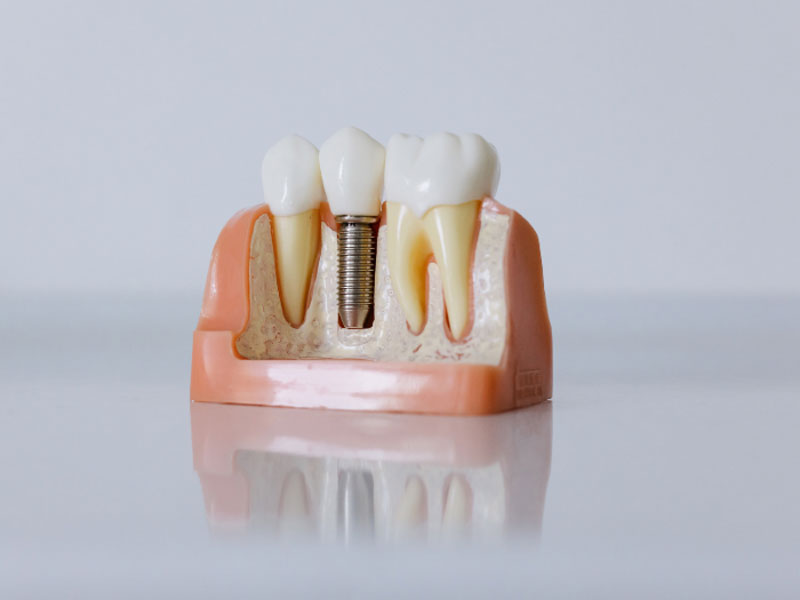Dental Implant vs. Bridges: How to Know What’s Best for You

If you have lost a permanent tooth or teeth due to an injury, periodontal disease, or other reasons, you have several options to consider for replacement. The easiest, it would seem, is to do nothing. This is the least advisable option in the dental field because it is important to replace a lost tooth to maintain maximum function, maintain alignment of surrounding teeth, and to preserve a healthy smile. If a missing tooth is not replaced, over time, the teeth adjacent to the space begin to drift into its place and move out of alignment affecting function and facial contour. Alignment changes can cause bite problems and Temporal Mandibular Joint dysfunction (TMJ).
The second option is a traditional bridge. A bridge requires the two adjacent teeth to the missing tooth to be “prepared” by removing the enamel layer which is a permanent alteration. Crowns are attached to the adjacent natural teeth on either side of the missing tooth space, and a pontic (fake) tooth fills in the gap. This creates a three-unit bridge. The gap is covered, but the artificial tooth is not actually fixed to the jaw. A bridge is usually made of either ceramics or porcelain fused to metal.
Dental Bridge: Pros and Cons
Pros: Many people choose the dental bridge option because the procedure is relatively quick and easy. In most cases, it can be completed in two visits usually within a few weeks, requiring less time for final results. Initially, the bridge seems to be the more affordable option.
Cons: The disadvantage of the bridge option is that it requires a lot of removal of enamel and tooth structure of adjacent teeth. This process can weaken teeth and make them prone to bacterial plaque accumulation and decay. Root canal therapy may be required if nerves are negatively affected. There is a greater tendency for gum disease. This option can lead to flexing and strain of the bone below the crowns which creates instability and shorter life span of bridge. Most crowns need to be replaced after 10 years. If adjacent teeth already have crowns, they must be redone to become part of the three-unit bridge.
The third option is a dental implant. An implant can be a single-tooth replacement system, with no effect on healthy adjacent teeth. It involves a minor surgical procedure where a titanium metal post is inserted into the jawbone in place of the missing tooth. After 3-6 months, the implant will become fused with the jawbone and will act as a fully integrated, fully functional artificial tooth root that will support a crown. At this point, an abutment is attached to the implant and protrudes above the gum line to provide a base where a crown is placed to complete a stable, durable prosthetic restoration. Once healed, dental implants serve as secure anchors for replacing missing teeth.
Dental Implant: Pros and Cons
Pros: The biggest benefit of a dental implant is that it supports jaw health. Dental implants stimulate and preserve natural bone growth. The bone remains strong and healthy. They look, feel, and function like a natural tooth. They are strong, stable and reliable. Implants do not compromise the integrity of adjacent teeth. There is a decreased risk of periodontal disease compared with a bridge and they do not decay. With proper maintenance, implants are a permanent solution that can last a lifetime.
Cons: The major drawback of a dental implant is that it requires minor surgery and a longer healing time before the placement of permanent crown. It is more expensive than a bridge, but it is more durable, so it can be more cost effective in the long term.
At first glance, it appears that a dental bridge is the more affordable route. But when comparing cost versus value and longevity, the dental implant can be the more cost effective and the better treatment option. What works best really depends on each individual’s unique situation.
At Lakeside Dental, we’ll consult with you to determine which option will work best in your particular case. With our state-of-the-art technology, we can fine tune your dental needs and help you achieve your oral health goals. Dentistry is always evolving and rest assured, we’ll have the latest options available to you. That’s something to smile about! Contact Lakeside Dental today and speak with our helpful staff to learn more.

